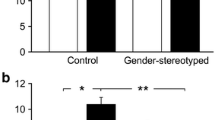Abstract
Children (mean age = 103 months) were provided with information about the relative abilities of two stimulus children at a specific activity. They then were asked to predict which child would likely be superior at a second highly related activity. The two stimulus children were either same sex or opposite sex, and the activities in each pair were sex typed as male or female. The design was a 2 (sex of subject) × 2 (age of subject) × 4 (stimulus pair—MM, FF, MF, FM) × 2 (sex type of activities) mixed design, with sex of subject and age of subject as the between-subjects factors. Each child responded to 32 instances, representing four replications of eight possible combinations. The dependent variable was the child's choice of the initially superior child or initially inferior child as better at the second activity. The prediction was that children would be less likely to assume that superiority could generalize to a second activity if the initial superiority contradicted sexstereotyped expectations. This result would indicate that sex stereotypes interfere with inferences processes, supporting a scehmatic model of sex stereotyping. The results were consistent with the prediction. Compared to a baseline condition in which sex stereotypes were not relevant, children were less likely to choose the initially superior child when the sex stereotype had been violated, and more likely to select that child when it had been confirmed.
Similar content being viewed by others
References
Alba, J. W., & Hasher, L. Is memory schematic? Psychological Bulletin 1983, 93 203–231.
Cann, A., & Garnett, A. G. Sex stereotype impacts on competence ratings by children. Sex Roles 1984, 11 333–343.
Cann, A., & Newbern, S. R. Sex stereotype effects in children's picture recognition. Child Development 1984, 55 1085–1090.
Deaux, K., & Lewis, L. L. Structure of gender stereotypes: Interrelationships among components and gender label. Journal of Personality and Social Psychology 1984, 46 996–1004.
DeLucia, L. A. The toy preference test: A measure of sex role identification. Child Development 1963, 34 107–117.
Koblinsky, S. G., Cruse, D. F., & Sugawara, A. I. Sex role stereotypes and children's memory for story content. Child Development 1978, 48 452–458.
Kriedberg, G., Butcher, A. L., & White, K. M. Vocational role choice in second- and sixthgrade children. Sex Roles 1978, 4 175–181.
Liben, L. S., & Signorella, M. L. Gender-related schemata and constructive memory in children. Child Development 1980, 51 11–18.
Liebert, R. M., McCall, R. B., & Hanratty, M. A. Effects of sex-typed information on children's toy preferences. Journal of Genetic Psychology 1971, 119 133–136.
Locksley, A., Borgida, E., Brekke, N., & Hepburn, C. Sex stereotypes and social judgment. Journal of Personality and Social Psychology 1980, 39 821–831.
Martin, C. L., & Halverson, C. F., Jr. A schematic processing model of sex typing and stereotyping in children. Child Development 1981, 52 1119–1134.
Martin, C. L., & Halverson, C. F., Jr. The effects of sex-typing schemas on young children's memory. Child Development 1983, 54 563–574.
Nadelman, L. Sex identity in American children: Memory, knowledge, and preference tests. Developmental Psychology 1974, 10 413–417.
Papilia, D. E., & Tennent, S. S. Vocational aspirations in preschoolers: A manifestation of early sex role stereotyping. Sex Roles 1975, 1 197–199.
Taylor, S. E., & Crocker, J. Schematic bases of social information processing. In E. T. Higgins, P. Hermann, & M. P. Zanna (Eds.), The Ontario symposium on personality and social psychology (Vol. 1). Hillsdale, N.J.: LEA, 1981.
Author information
Authors and Affiliations
Additional information
The authors would like to extend their appreciation to the principal, teachers, and students of Park Road Elementary School. This research was supported in part by funds from the Foundation of the University of North Carolina at Charlotte and from the State of North Carolina.
Rights and permissions
About this article
Cite this article
Cann, A., Palmer, S. Children's assumptions about the generalizability of sex-typed abilities. Sex Roles 15, 551–558 (1986). https://doi.org/10.1007/BF00288231
Issue Date:
DOI: https://doi.org/10.1007/BF00288231




